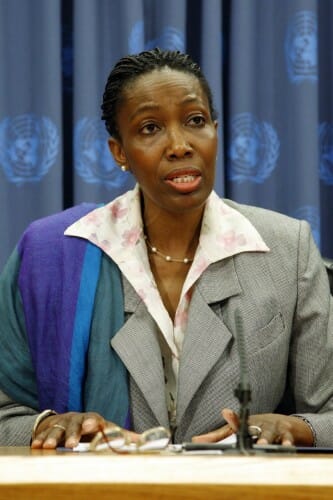Diplomat Dessima Williams visits campus as Distinguished Visiting Scholar
Grenadian diplomat Dessima Williams is visiting campus as the Human Rights Program’s inaugural Distinguished Visiting Scholar in Human Rights, from March 28 to April 8.
Williams served as Grenada’s Ambassador to the United Nations from 2009-2013, and as the Chair of the Alliance of Small Island Developing States (AOSIS) leading a 40-island global climate-change effort through climate change negotiations. She has been an advocate for children and women’s rights and has been a long-time supporter of sustainable development.

Dessima Williams
In 2016, Williams was appointed Special Adviser for Implementation of the Sustainable Development Goals at the United Nations. She has served as Strategic Adviser to Oxfam International on climate change.
Williams has taught at secondary, college and university levels and is an advocate for the rights of women and children, for farmers and for rural development. She is the founder and Executive Director of the Grenada Education and Development Programme (GRENED) which works with rural, young school-aged girls and boys and supports them as emerging leaders.
Williams completed her graduate studies in International Relations at American University and has a bachelor’s degree from the University of Minnesota. She has taught political science at Williams College and was a professor of sociology, development and gender at Brandeis University.
During her residency, Williams will participate in the Wisconsin International Law Journal symposium on climate law and meet with law students as part of the Directed Research on Climate Change, which is under the supervision of Sumudu Atapattu, a leading scholar on law and climate change.
Williams will visit and speak in a number of classes on campus and will give a lecture on human rights to students at Madison East High School. She will meet with various student groups on campus, including holding a career discussion with the King Morgridge Scholars Program, a conversation with International Studies majors, and a meeting with the Wisconsin International Scholars.
Williams’ residency is supported by the Law School and the Institute for Regional and International Studies National Resource Center within UW–Madison’s International Division.




